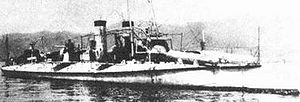Japanese torpedo boat Kotaka
 Kotaka (1887) | |
| Career | Japanese Navy Ensign |
|---|---|
| Name: | Kotaka |
| Ordered: | 1885 |
| Builder: | Yarrow & Company, United Kingdom |
| Laid down: | 1887 |
| Completed: | 10 October 1888 |
| Commissioned: | 19 August 1890 |
| Decommissioned: | 1 April 1908 |
| General characteristics | |
| Type: | Torpedo boat |
| Displacement: | 203 long tons (206 t) |
| Length: | 50.3 m (165 ft) |
| Beam: | 5.8 m (19 ft) |
| Draught: | 1.7 m (5 ft 7 in) |
| Propulsion: | Coal-fired engine (mixed coal/oil from 1904), 1,400 hp (1,044 kW) |
| Speed: | 19 knots (22 mph; 35 km/h) |
| Armament: |
• 4 × 37 mm (1.5 in) guns • 6 × 360 mm (14 in) torpedo tubes |
Kotaka (小鷹, "Falcon") was a torpedo boat of the Imperial Japanese Navy. She was ordered in 1885 from the shipbuilder Yarrows in London, Great Britain, where she was built in parts along Japanese specifications, and then assembled in Yokosuka Naval Arsenal, Japan.
She participated to the First Sino-Japanese War (1894–1895) and the Russo-Japanese War (1904–1905). She was decommissioned on 1 April 1908, to become a training ship. She was retired on 1 March 1916, but again reactivated in 1917, to end her career in January 1927.
When launched in 1888, the Kotaka, at 203 tons, was the largest torpedo boat in the world, and "was the forerunner of torpedo-boat destroyers that appeared a decade later" (Kaigun, David C. Evans). She was armed with four 1-pounder (37 mm) quick-firing guns and six torpedo tubes. In the following years, the Imperial Japanese Navy equipped herself with much smaller torpedo boats of French design, but in her trials in 1899, the Kotaka demonstrated that she could go beyond a role of coastal defense, and was capable of following larger ships on the high seas. The British shipbuilder Yarrow "considered Japan to have effectively invented the destroyer" (Howe).
The next specific design of torpedo boat destroyer, with the range and speed to keep up with battleships, was the Havock class of two ships of the Royal Navy, developed in 1892 under the newly appointed Third Sea Lord Rear Admiral Jackie Fisher, and launched in 1893. The Havock had a 240 tons displacement, a speed of 27 knots, and was armed with a single 12-pounder gun, three 6-pounders, and three torpedo tubes.
In 1904, Kotaka was experimentally refitted with a mixed oil and coal engine, instead of her original coal-only propulsion.
See also
References
- Kaigun: Strategy, Tactics, and Technology in the Imperial Japanese Navy, 1887–1941, David C. Evans, Mark R. Peattie, Naval Institute Press, Annapolis, Maryland ISBN 0-87021-192-7
- The Origins of Japanese Trade Supremacy: Development and Technology in Asia from 1540 to the Pacific War, Christopher Howe, The University of Chicago Press, ISBN 0-226-35485-7
External links
| |||||||
